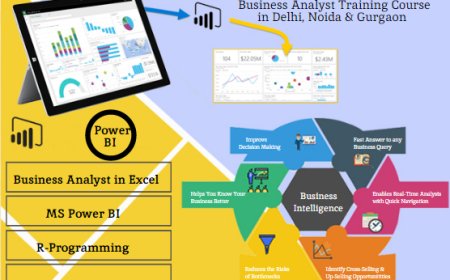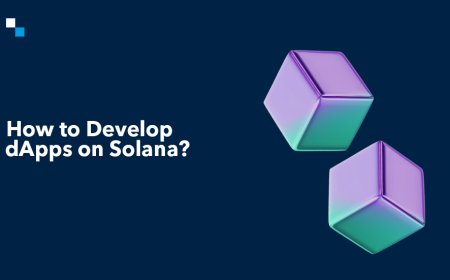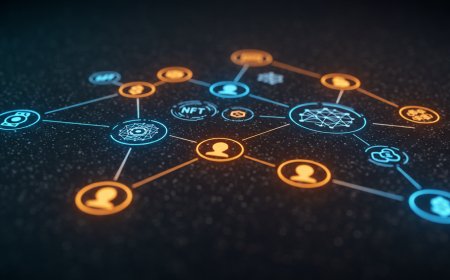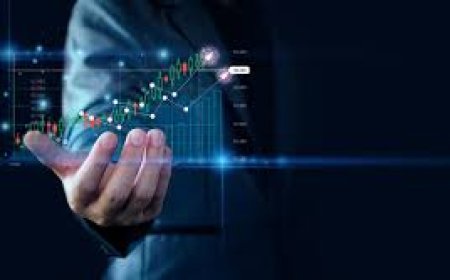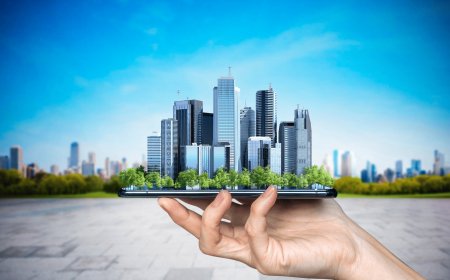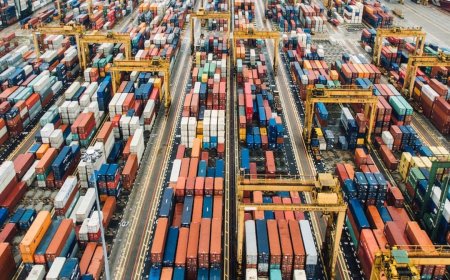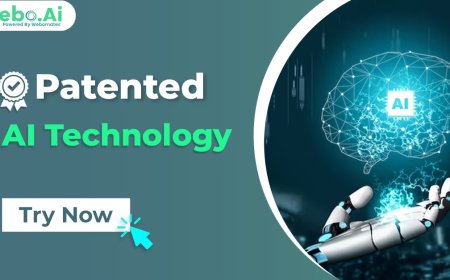How Is AI Development Revolutionizing Modern Industries?
AI development is driving a seismic shift across modern industries by automating processes, enhancing decision-making, and enabling innovative business models.

Artificial Intelligence (AI) has transformed from a futuristic concept into a practical reality thats reshaping the global economy. AI developmentthe creation and enhancement of intelligent systems that simulate human reasoning, learning, and decision-makingis having a profound impact on industries across the board. From healthcare and finance to manufacturing and marketing, AI is revolutionizing how businesses operate, innovate, and compete.
This blog explores how AI development is revolutionizing modern industries, driving efficiency, improving customer experiences, and opening new avenues for growth.
Understanding AI Development
Before diving into industry-specific transformations, it's important to understand what AI development encompasses. AI development involves designing algorithms, training machine learning models, and integrating these systems into applications that can autonomously perform tasks. These may include:
-
Natural Language Processing (NLP): Understanding and generating human language.
-
Machine Learning (ML): Enabling systems to learn and improve from data.
-
Computer Vision: Interpreting visual information from the world.
-
Robotics: Automating physical tasks through AI-powered machines.
AI developers use tools such as Python, TensorFlow, PyTorch, and cloud platforms like AWS or Azure to build and scale intelligent systems. The end goal is to create solutions that can make decisions, solve problems, and drive outcomes with minimal human input.
1. Healthcare: AI-Powered Precision and Prediction
In healthcare, AI is transforming everything from diagnostics to drug development.
-
Medical Imaging: AI models analyze X-rays, MRIs, and CT scans with accuracy often surpassing human radiologists. Tools like Googles DeepMind have shown groundbreaking capabilities in detecting eye diseases and breast cancer.
-
Predictive Analytics: Hospitals use AI to forecast patient deterioration, prevent readmissions, and optimize resource allocation.
-
Drug Discovery: AI accelerates the development of new drugs by analyzing massive biological datasets and predicting how different compounds will interact.
-
Virtual Health Assistants: AI chatbots provide preliminary diagnoses and health advice, improving access to care while reducing burden on healthcare professionals.
These advancements are not only increasing efficiency but also enhancing patient outcomes through early detection and personalized treatment plans.
2. Finance: From Fraud Detection to Smart Investing
The financial sector was among the earliest adopters of AI, and its influence continues to grow.
-
Fraud Detection: AI algorithms monitor transactions in real time, identifying unusual patterns and preventing fraud.
-
Algorithmic Trading: AI-powered systems execute trades at lightning speed based on real-time market analysis, reducing risk and increasing profitability.
-
Credit Scoring: Traditional credit models are being replaced with AI models that assess creditworthiness using alternative data such as online behavior and transaction histories.
-
Customer Support: Banks are using AI-powered chatbots for 24/7 customer service, handling inquiries, account management, and loan applications efficiently.
AI is improving decision-making, reducing operational costs, and enhancing security in a highly sensitive and competitive industry.
3. Retail & E-Commerce: Personalization at Scale
Retail has undergone a seismic shift thanks to AI.
-
Recommendation Engines: AI personalizes the shopping experience by analyzing customer behavior to suggest products, increasing conversion rates.
-
Inventory Management: AI forecasts demand more accurately, helping businesses optimize stock levels and reduce waste.
-
Visual Search: Shoppers can upload images and find similar products using AI-powered image recognition.
-
Customer Service: Virtual assistants and AI chatbots answer queries instantly, resolve complaints, and enhance satisfaction.
By leveraging AI, retailers are delivering hyper-personalized experiences, reducing churn, and maximizing profitability.
4. Manufacturing: Smart Automation and Quality Control
Manufacturing has embraced AI through Industry 4.0 innovations, integrating intelligent systems into production lines.
-
Predictive Maintenance: AI analyzes sensor data to predict equipment failures before they happen, minimizing downtime and repair costs.
-
Robotics: Collaborative robots (cobots) work alongside humans, performing repetitive or dangerous tasks with precision.
-
Quality Inspection: AI vision systems detect defects or irregularities in products far more efficiently than manual inspection.
-
Supply Chain Optimization: AI enhances logistics planning, reducing delays and lowering operational costs.
AI is enabling manufacturers to produce more efficiently, with greater flexibility, and at a lower cost.
5. Marketing & Advertising: Smarter Campaigns with AI
Marketing has been fundamentally transformed by AI, especially in digital advertising and customer engagement.
-
Audience Targeting: AI identifies high-value audiences and serves personalized ads to improve ROI.
-
Content Creation: Generative AI tools create ad copy, blog posts, product descriptions, and social media content at scale.
-
Email Automation: AI segments email lists and personalizes messaging based on user behavior.
-
Sentiment Analysis: Brands use AI to analyze customer feedback and social media chatter to measure brand perception and campaign effectiveness.
With AI, marketers can make data-driven decisions, streamline workflows, and create more impactful campaigns.
6. Transportation & Logistics: The Rise of Intelligent Mobility
AI is revolutionizing transportation through smarter navigation, route optimization, and autonomous vehicles.
-
Self-Driving Cars: Companies like Tesla, Waymo, and Uber are developing AI-powered vehicles that navigate roads with minimal human input.
-
Route Optimization: Logistics companies use AI to determine the most efficient routes, saving time and fuel.
-
Demand Forecasting: AI helps predict transportation needs, enabling better fleet management and reducing delivery delays.
-
Predictive Maintenance: Similar to manufacturing, AI in logistics can monitor the health of transport vehicles and schedule timely repairs.
AI is not only enhancing efficiency but also reducing environmental impact through better fuel management and fewer empty miles.
7. Education: Personalized and Adaptive Learning
AI is transforming the learning experience for students and educators alike.
-
Adaptive Learning Platforms: AI tailors course content based on a students performance, pace, and preferences.
-
Automated Grading: AI tools can grade assignments and tests, freeing up teachers to focus on instruction.
-
Virtual Tutors: AI-powered tutoring systems help students understand difficult concepts and reinforce learning outside the classroom.
-
Learning Analytics: Educational institutions use AI to monitor student progress and intervene early when students are at risk of falling behind.
By making education more accessible, personalized, and efficient, AI is helping build a smarter, more capable future workforce.
8. Real Estate & Construction: Smarter Cities, Smarter Structures
AI is bringing innovation to both real estate and construction industries.
-
Property Valuation: AI tools analyze market trends, location data, and comparable sales to accurately price properties.
-
Smart Buildings: AI is used in HVAC, lighting, and security systems to reduce energy consumption and enhance occupant comfort.
-
Construction Planning: AI predicts potential delays and cost overruns, optimizing project management.
-
Virtual Tours & Chatbots: Real estate platforms use AI to offer 3D tours and automated customer service for buyers and renters.
As urbanization increases, AI is essential in building smart, sustainable cities.
9. Agriculture: Precision and Sustainability
Agriculture, one of the oldest industries, is being revitalized with AI.
-
Crop Monitoring: AI-powered drones and sensors monitor crop health and detect pest infestations early.
-
Yield Prediction: AI models forecast yields based on weather patterns, soil conditions, and satellite imagery.
-
Smart Irrigation: AI systems optimize water usage based on real-time data, conserving resources and improving productivity.
-
Automated Harvesting: AI-driven robots are used for picking fruits and vegetables, reducing labor costs.
AI is helping feed the world more sustainably by optimizing inputs and maximizing outputs.
Challenges in AI Development
Despite its benefits, AI development comes with challenges:
-
Data Privacy: Handling sensitive user data requires strict compliance with privacy laws.
-
Bias and Fairness: Poor training data can lead to biased AI decisions.
-
Explainability: Black-box AI models can be hard to interpret, raising trust issues.
-
Skills Gap: A shortage of skilled AI professionals can limit adoption.
Addressing these concerns is crucial to ensure AI is used ethically and effectively.
The Road Ahead
As AI development continues to evolve, we can expect even deeper integration into everyday life. Technologies like Generative AI, Quantum AI, and autonomous agents are set to redefine what's possible across all sectors.
Governments and organizations must focus on building ethical, transparent, and inclusive AI systems to harness their full potential. Investing in AI research, upskilling the workforce, and fostering responsible innovation will be key to driving sustainable growth.
Conclusion
AI development is not just an emerging trendits a transformative force redefining how industries function and grow. Whether its optimizing supply chains, enhancing customer experiences, or accelerating scientific discovery, AI is at the heart of the next industrial revolution. Businesses that embrace AI today will be the leaders of tomorrow, while those who resist may find themselves left behind.
If your organization is looking to stay ahead in the digital age, now is the time to explore how AI development can revolutionize your operations and unlock new possibilities.


